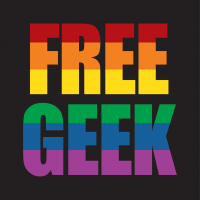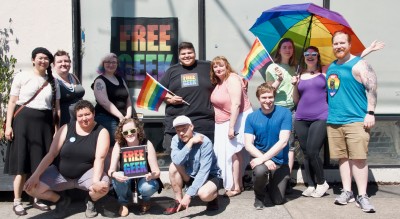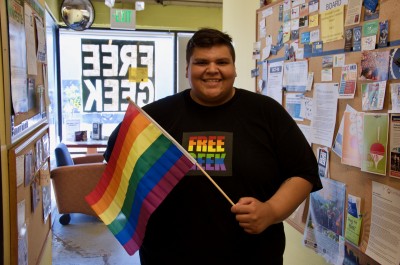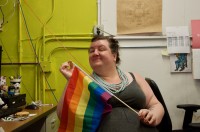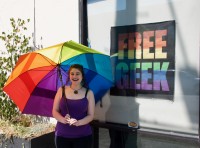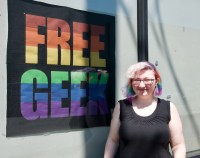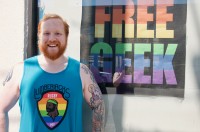We at Free Geek are proud to stand alongside and support the LGBTQ community.
Throughout the month of June, Pride is celebrated by people from all walks of life. Festivals and parades invite members of the LGBTQ community and allies to celebrate LGBTQ social and self-acceptance, achievements, legal rights and pride. There is much to celebrate -- Pride is the outlook that bolsters the LGBTQ rights movement.
Progress is made every day. In 1996, the Defense of Marriage Act, which defined marriage as the union of one man and one woman and allowed states to refuse to recognize same-sex marriages was the law of the land. Slowly states began to recognize same-sex marriage, and eventually, in 2013, DOMA was ruled unconstitutional. Two years later, the United States Supreme Court ruled in Obergefell v. Hodges (2015) that same-sex couples were guaranteed the fundamental right to marry under the Due Process Clause and the Equal Protection Clause of the Fourteenth Amendment.
It’s been four years since the decision of Obergfell (2015), and while there are many reasons to celebrate, we cannot forget the path that brought us to where we are today: the struggles of our queer siblings before us, and the ongoing fight for recognition, acceptance, and equality. We must always remember the most pivotal moment in modern LGBTQ social movements: the Stonewall riots.
On June 28, 1969, the police arrived at the Stonewall Inn, a gay bar in New York City’s Greenwich Village. While raids on queer-tolerant establishments were common in the 1960s, the 200 patrons inside that night didn't just sit down and wait to be arrested — starting with a few pivotal people, like Stormé DeLarverie, they resisted, and then their resistance became a riot that sent the police and the world a loud and clear message about their frustration with the second-class-citizen status quo for LGBT individuals. The Stonewall riots lasted for a week and became an instant catalyst for organization and equal rights activism. That following year, In June of 1970, bisexual activist Brenda Howard (known as the “Mother of Pride”) coordinated the first LGBT Pride march to commemorate the Stonewall riots. This year marks the 50th anniversary of Stonewall and the 49th anniversary of Pride. Much has changed over the last 50 years, but members of the LGBTQ community are still fighting for recognition and acceptance…
Today, Pride events are held annually during the month of June to recognize the challenges, accomplishments and impact LGBTQ people have had in the world. This year marks the 25th anniversary of the annual Portland Pride Waterfront Festival and Parade. In the spirit of the Stonewall riots, Pride is a time honored opportunity to raise the visibility of queer identities, celebrate the culture and contributions of the community, and to raise the voices of all LGBTQ+ people-- across the region and even in places around the world, like Austria, Botswana, Ecuador, and Taiwan-- that are only just beginning to see equal rights activism make legislative difference.
We at Free Geek are proud to stand alongside and support the LGBTQ community. Our mission is to create a community to empower everyone to reach their full potential, and that includes raising the voices of marginalized communities. We value the importance of diversity, inclusivity, and equality-- embracing the differences that make us all unique and elevating the common values we share.
Juan Muro: Manager of Retail and Tech Support
We hope to show our support by showcasing to our community some of the LGBTQ-identifying individuals who make Free Geek’s mission possible! Check out below what LGBTQ-identifying individuals in our community are saying about what Pride means to them, and what they love about working at Free Geek as an LGBTQ-identifying person!
Claire Wilette,
Grantwriter & Development Consultant:
“For me, Pride is a time to honor the past generations of LGBTQ+ people who fought and endured and died defending their basic humanity, their identity and their right to love, in the hopes that it might move society forward for the rest of us. It's a time to celebrate our own survival and resilience, and the progress we've made, even while knowing that we're nowhere near done yet. It's an opportunity to remind the rest of the world that we're still here.
No organization is perfect, because people aren't perfect, but the thing that matters is whether or not you're always trying to be better today than you were yesterday. Something I really value about Free Geek is that I think the people who work here are constantly looking for ways to be better, to do better, to make the community better - from how to keep millions of pounds of electronic waste out of landfills, to how to teach refugees who don't speak English how to use technology, to trying to create the safest and most welcoming work environment possible for their employees. As a woman, as a queer person, I feel like I'm in a space where the people around me are committed to providing an environment where all of us can thrive. That goes beyond just hanging up a few Pride posters or changing your Facebook logo. It's about how everyone treats each other, whether you feel seen and heard, whether you trust that you'd be taken seriously if there was a problem, where people want you to be able to bring your whole self to work every day. It's really an incredibly special place.”
Becca Goldberg,
Public Services Staff Member:
“For me, Pride exists a symbol of bravery and strength. It is a demonstration of what it takes to rise above the obstacles and systemic oppression LGBTQ+ folks have faced throughout history. At the risk of sounding like a staunch social studies teacher, Pride is rooted in acknowledging the darkness of the past. Don't get me wrong; I am all for a big, gay party (my favorite kind of party), but I think that people at commercialized "rainbow-capitalist" Pride events tend to forget that this began as a protest.
For centuries, LGBTQ+ people had to hide who they were at the risk of arrest, losing their jobs, and even being thrown in mental institutions. Their identities were treated as an illness or deviance. We need to understand that for a long time, queer folks were seen as rejects and weren't allowed to exist freely in society. In many places that is still the case. To treat LGBTQ+ people like just regular people was considered a radical act. That is the reason we should reflect on how Pride began and why we need it. Pride exists because of Marsha P. Johnson: a bisexual, black, trans, sex-worker, who started the Stonewall riot by throwing a brick at a police officer. On that night in 1969, people were being persecuted by police for simply being themselves. Many were beaten and arrested for a variety of things, including dressing in drag -- something that is now part of popular culture, TV, and beyond. It has become so normalized that we hardly stop to recollect that that hasn't been the case for very long.
Ultimately, we must remember our past, so that we do not take our current freedoms for granted. With that in mind, we should reflect on the fact that Pride represents self-love and celebration in the midst of the struggle against violence and the suppression of human rights. These are things that many folks are still not afforded around the globe, even in 2019. So: dress up, dance, and enjoy the party. Take up space, be proud of who you are, and revel in joy and love. But also remember that people are still fighting for these same rights in many parts of the world. Conversion therapy is still legal in many places, parents still disown their children for being queer, and trans folks still have the highest murder and suicide rates. Most importantly, it means we must show up for the cause in other ways than at a party. We must fight not only for our rights but the rights of other marginalized folks. We must move forward knowing that if our social justice doesn't include trans folks, disabled folks, the poor, people of color, and sex workers, then we have nothing to be proud of.
Working at at a place where I feel not only accepted but celebrated as a queer person has been a really refreshing experience. Instead of feeling like I am part of a minority, I know I can relate to so many of my coworkers on a level I have never felt before. We can laugh and enjoy each others company in a light-hearted way that I had not yet experienced. We also know that if push came to shove, we would have each others' backs. There is a certain comfort that is afforded when you are in a space that has clear, concrete values about inclusivity reflected in the staff. I just hope that as Free Geek continues to change and grow, we keep on enacting those values in the staff we hire and the way we interact with the community.”
Julie McGowan,
Public Services Team Lead:
“Pride, to me, means to have a brave authenticity, embracing a wholeness of self; it is a celebration of the multitudes we carry as individuals and as a community. Community is vital to Pride-- many aren't free, or can't be out, and community protects and supports those who don't have recognition in equal rights. Pride is a tradition-- the Stonewall riots that it commemorates were a catalyst for organization and activism, and it serves as a powerful reminder to me that there is more work to be done.
I appreciate that I don't feel like I have to hide parts of myself here and that I have a voice. I also love to extend that inclusivity to our volunteers and learners-- it is important to me that Free Geek remains a place where all are welcomed openly.”
Tyler Davis,
Annual Funds and Events Associate:
“For me, Pride is multifaceted -- it means accepting yourself for who you are, and being proud of all you stand for; it's a celebration of both social and self-acceptance, coupled with the recognition of the challenges overcome by the LGBTQ+ community; and recognition of the progress we have yet to achieve.
Growing up in a conservative, religious household, it took me a long time to 1) admit to myself that I was gay, and 2) accept myself for who I am. However, when I came out, I was met with overwhelming love and support from my friends, family, and members of my community. I am fortunate to have found my place within a community that accepts me and have a supportive network that loves me unconditionally. Unfortunately, my experience is not the status quo. As a result of family rejection, discrimination, criminalization and a host of other factors, LGBTQ youth represent as much as 40% of the homeless youth population. Of that population, studies indicate that as many as 60% are likely to attempt suicide.
Many of us who are “out and proud” come from a point of privilege and many LGBTQ-identifying individuals are not in a safe space to come out and be their truest self. Pride means using that privilege to empower those whose voices aren’t being heard, and ensuring that people of all identities and orientations feel that they can celebrate who they are without fear.
We must recognize and celebrate our own individual journey to self-acceptance, pay respect for the sacrifices made for the collective progress of the LGBTQ community, embrace those who are struggling to find peace and acceptance both internally and externally and continue paving the way forward for those who will come after us. We have made a lot of progress as a community, but there is still a lot of work to be done.
My hope is that one day, no one will feel the need to “come out” -- all identities and orientations are accepted. Until that day, we must keep moving forward and working towards that goal.
Working at Free Geek has been a wonderful experience. As an openly gay man, I don’t only feel accepted, but welcomed as a member of the Free Geek community. In past jobs and professional situations, I felt the need to hide that part of myself -- but here at Free Geek, I can be my authentic self. It’s empowering to know that the LGBTQ community is supported and celebrated by our staff and is further represented in the community services we provide. Free Geek is truly an inclusive and welcoming work environment, where all identities and expressions are embraced. We are as diverse of a community internally, as the diverse community we serve externally. I love being a part of an organization that not only emphasizes the values of diversity and inclusion but puts them into practice to empower people throughout the community to reach their full potential.
John Ascraft,
Chief EH&S Compliance Officer, Manager of Receiving and Recycling:
"I identify as Queer because I see gender and sexuality as a spectrum rather than a binary. This rarely conflicts with the way strangers see me or the privileges that my other identities (apparently white, straight, cis, middle class) give. I love Free Geek because of its early and ongoing dedication to inclusivity. We often focus on dismantling barriers to entry and retention, even when the momentum of our industry and economy push us towards homogenizing. It was refreshing to find that in 2010 Free Geek had an established practice of providing healthcare to partners of staff regardless of gender or marital status. I have seen our community, including volunteers, support each other, learn new ways to empathize and call out harmful behavior. I'm proud to be part of this community."
